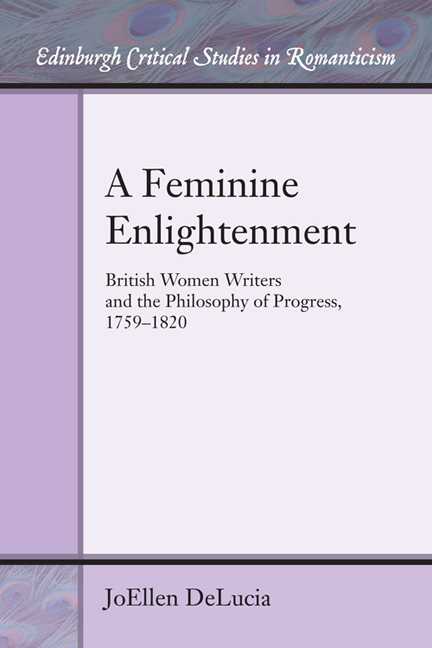Book contents
- Frontmatter
- Contents
- Acknowledgments
- Introduction: A Feminine Enlightenment?
- 1 The Progress of Feeling: The Ossian Poems and Adam Smith's Theory of Moral Sentiments
- 2 Ossianic History and Bluestocking Feminism
- 3 Queering Progress: Anna Seward and Llangollen Vale
- 4 Poetry, Paratext, and History in Radcliffe's Gothic
- 5 Stadial Fiction or the Progress of Taste
- Epilogue: Women Writers in the Age of Ossian
- Bibliography
- Index
2 - Ossianic History and Bluestocking Feminism
Published online by Cambridge University Press: 05 August 2016
- Frontmatter
- Contents
- Acknowledgments
- Introduction: A Feminine Enlightenment?
- 1 The Progress of Feeling: The Ossian Poems and Adam Smith's Theory of Moral Sentiments
- 2 Ossianic History and Bluestocking Feminism
- 3 Queering Progress: Anna Seward and Llangollen Vale
- 4 Poetry, Paratext, and History in Radcliffe's Gothic
- 5 Stadial Fiction or the Progress of Taste
- Epilogue: Women Writers in the Age of Ossian
- Bibliography
- Index
Summary
Although filled with references to James Macpherson and his Ossian poems, the correspondence of Elizabeth Montagu, the Queen of the Bluestockings, rarely mentions the debates over the poems’ provenance, an issue that preoccupied Montagu's contemporaries such as Samuel Johnson, Thomas Percy, and David Hume. In a letter to Lord Lyttelton from 1760, Montagu responds playfully to the forgery accusations leveled at Macpherson soon after the initial publication of the Fragments of Ancient Poetry: “The Bishop of Ossory tells me Mr. Macpherson receives 100 per annum subscription while he stays in the Highlands to translate the poems; if he is writing them, he should have a thousand at least.” In another letter, she offered a more measured and thoughtful response: “the poems cannot be as ancient as pretended. It seems to me possible, that some great bard might from uncertain and broken tradition, and from the scattered songs of former bards, form an epic poem, which might not agree with history.” When pressed, she acknowledges the anachronisms within the poems but refuses to take sides in the raging debates over their historical legitimacy, concluding that she finds “great difficulty in believing or disbelieving the authenticity of these poems.” Despite this ambivalence, she remained a passionate devotee of Ossianic poetry and a close friend of Macpherson and his advocates, Hugh Blair and Lord Kames. The poems’ real or pretended third-century origins became for nineteenth- and twentieth-century readers the defining factor in the poems’ placement within literary history; Montagu's response to the Ossian debate suggests that eighteenth-century readers’ interest in the poems extended far beyond Macpherson's dubious translating practices. Largely uninterested in verifying the poems’ author or their precise date of origin, Montagu and her fellow Bluestockings were fascinated by the questions the poems raised about history and progress. The poems, which featured men and women singing and often fighting alongside one another in a clearly premodern world, raised important questions for the Bluestockings about the relationship between women's social progress and economic development.
In many ways the Ossian poems provided a template for Bluestocking salons, where both sexes debated issues of literary, social, and political interest. Although the term Bluestocking conjures the image of a socially awkward and often masculine woman, whose devotion to study and the betterment of the female condition make her poorly suited for her domestic duties, this understanding did not emerge until the late eighteenth century.
- Type
- Chapter
- Information
- A Feminine EnlightenmentBritish Women Writers and the Philosophy of Progress, 1759-1820, pp. 50 - 86Publisher: Edinburgh University PressPrint publication year: 2015



